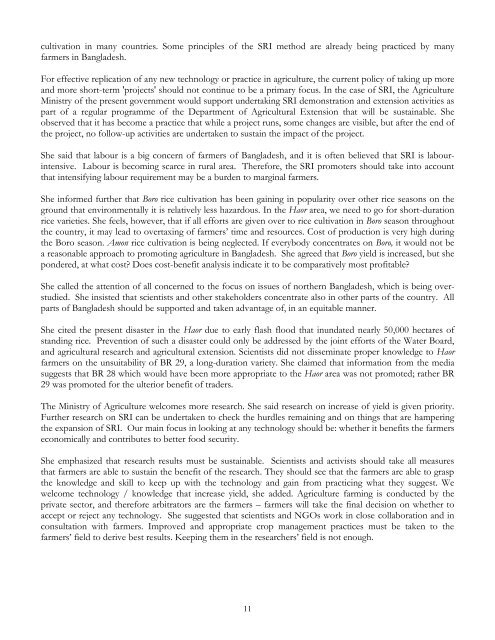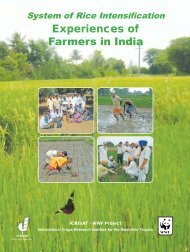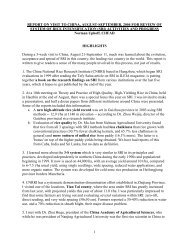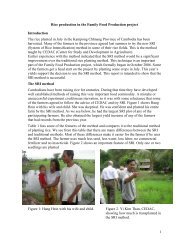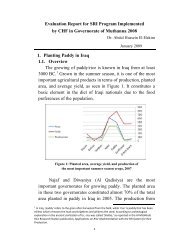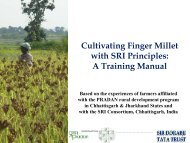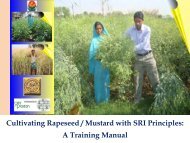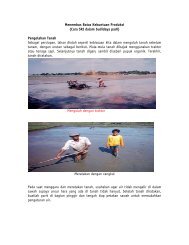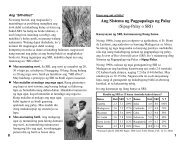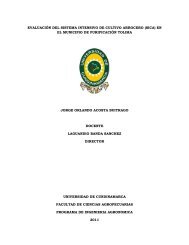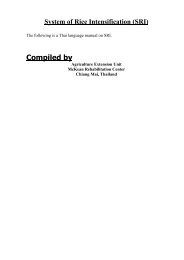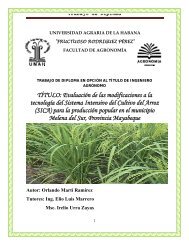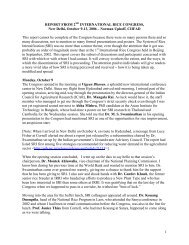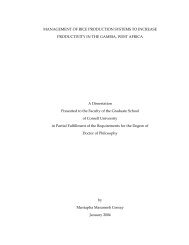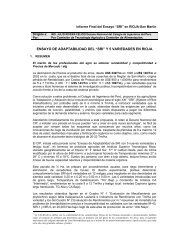Revised proceedings - The System of Rice Intensification - Cornell ...
Revised proceedings - The System of Rice Intensification - Cornell ...
Revised proceedings - The System of Rice Intensification - Cornell ...
You also want an ePaper? Increase the reach of your titles
YUMPU automatically turns print PDFs into web optimized ePapers that Google loves.
cultivation in many countries. Some principles <strong>of</strong> the SRI method are already being practiced by many<br />
farmers in Bangladesh.<br />
For effective replication <strong>of</strong> any new technology or practice in agriculture, the current policy <strong>of</strong> taking up more<br />
and more short-term 'projects' should not continue to be a primary focus. In the case <strong>of</strong> SRI, the Agriculture<br />
Ministry <strong>of</strong> the present government would support undertaking SRI demonstration and extension activities as<br />
part <strong>of</strong> a regular programme <strong>of</strong> the Department <strong>of</strong> Agricultural Extension that will be sustainable. She<br />
observed that it has become a practice that while a project runs, some changes are visible, but after the end <strong>of</strong><br />
the project, no follow-up activities are undertaken to sustain the impact <strong>of</strong> the project.<br />
She said that labour is a big concern <strong>of</strong> farmers <strong>of</strong> Bangladesh, and it is <strong>of</strong>ten believed that SRI is labourintensive.<br />
Labour is becoming scarce in rural area. <strong>The</strong>refore, the SRI promoters should take into account<br />
that intensifying labour requirement may be a burden to marginal farmers.<br />
She informed further that Boro rice cultivation has been gaining in popularity over other rice seasons on the<br />
ground that environmentally it is relatively less hazardous. In the Haor area, we need to go for short-duration<br />
rice varieties. She feels, however, that if all efforts are given over to rice cultivation in Boro season throughout<br />
the country, it may lead to overtaxing <strong>of</strong> farmers‟ time and resources. Cost <strong>of</strong> production is very high during<br />
the Boro season. Amon rice cultivation is being neglected. If everybody concentrates on Boro, it would not be<br />
a reasonable approach to promoting agriculture in Bangladesh. She agreed that Boro yield is increased, but she<br />
pondered, at what cost? Does cost-benefit analysis indicate it to be comparatively most pr<strong>of</strong>itable?<br />
She called the attention <strong>of</strong> all concerned to the focus on issues <strong>of</strong> northern Bangladesh, which is being overstudied.<br />
She insisted that scientists and other stakeholders concentrate also in other parts <strong>of</strong> the country. All<br />
parts <strong>of</strong> Bangladesh should be supported and taken advantage <strong>of</strong>, in an equitable manner.<br />
She cited the present disaster in the Haor due to early flash flood that inundated nearly 50,000 hectares <strong>of</strong><br />
standing rice. Prevention <strong>of</strong> such a disaster could only be addressed by the joint efforts <strong>of</strong> the Water Board,<br />
and agricultural research and agricultural extension. Scientists did not disseminate proper knowledge to Haor<br />
farmers on the unsuitability <strong>of</strong> BR 29, a long-duration variety. She claimed that information from the media<br />
suggests that BR 28 which would have been more appropriate to the Haor area was not promoted; rather BR<br />
29 was promoted for the ulterior benefit <strong>of</strong> traders.<br />
<strong>The</strong> Ministry <strong>of</strong> Agriculture welcomes more research. She said research on increase <strong>of</strong> yield is given priority.<br />
Further research on SRI can be undertaken to check the hurdles remaining and on things that are hampering<br />
the expansion <strong>of</strong> SRI. Our main focus in looking at any technology should be: whether it benefits the farmers<br />
economically and contributes to better food security.<br />
She emphasized that research results must be sustainable. Scientists and activists should take all measures<br />
that farmers are able to sustain the benefit <strong>of</strong> the research. <strong>The</strong>y should see that the farmers are able to grasp<br />
the knowledge and skill to keep up with the technology and gain from practicing what they suggest. We<br />
welcome technology / knowledge that increase yield, she added. Agriculture farming is conducted by the<br />
private sector, and therefore arbitrators are the farmers – farmers will take the final decision on whether to<br />
accept or reject any technology. She suggested that scientists and NGOs work in close collaboration and in<br />
consultation with farmers. Improved and appropriate crop management practices must be taken to the<br />
farmers‟ field to derive best results. Keeping them in the researchers‟ field is not enough.<br />
11


